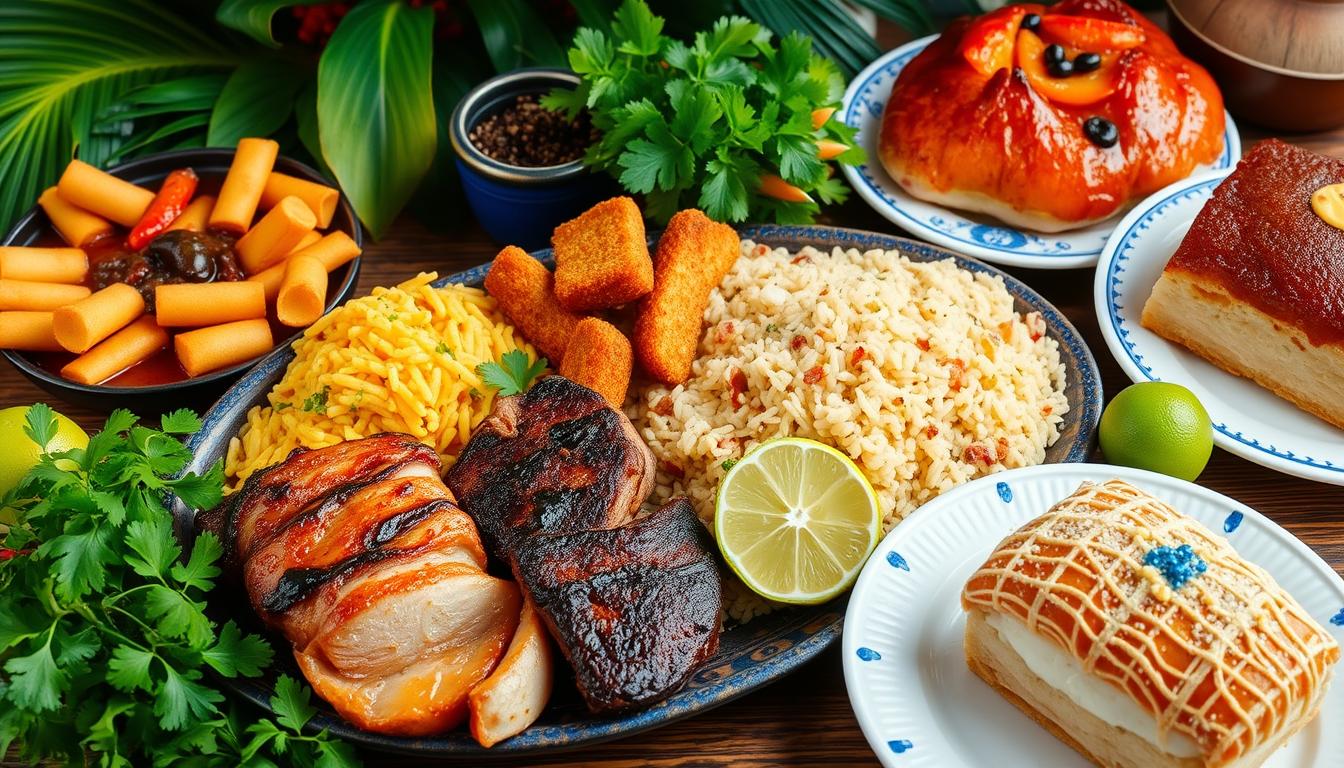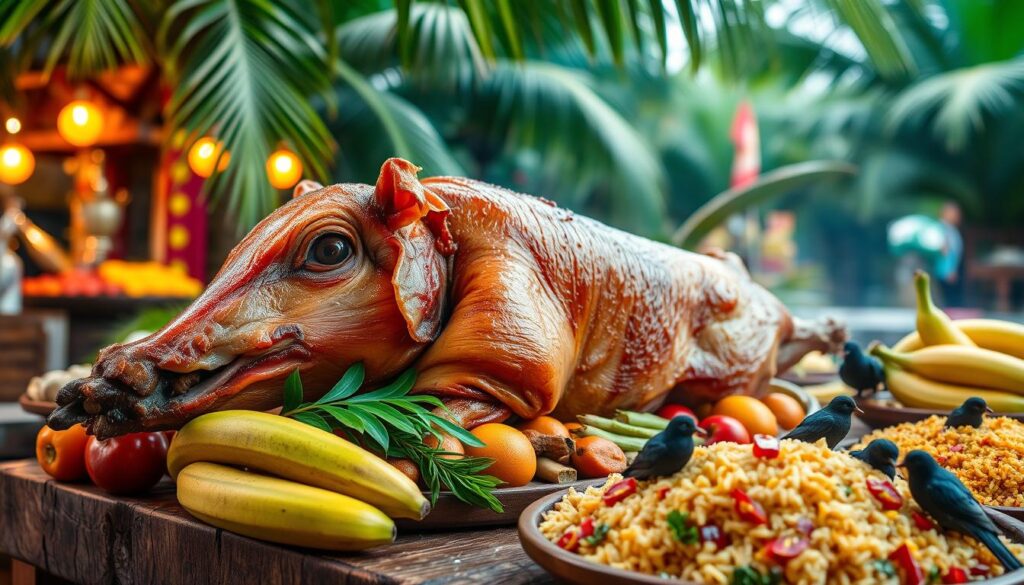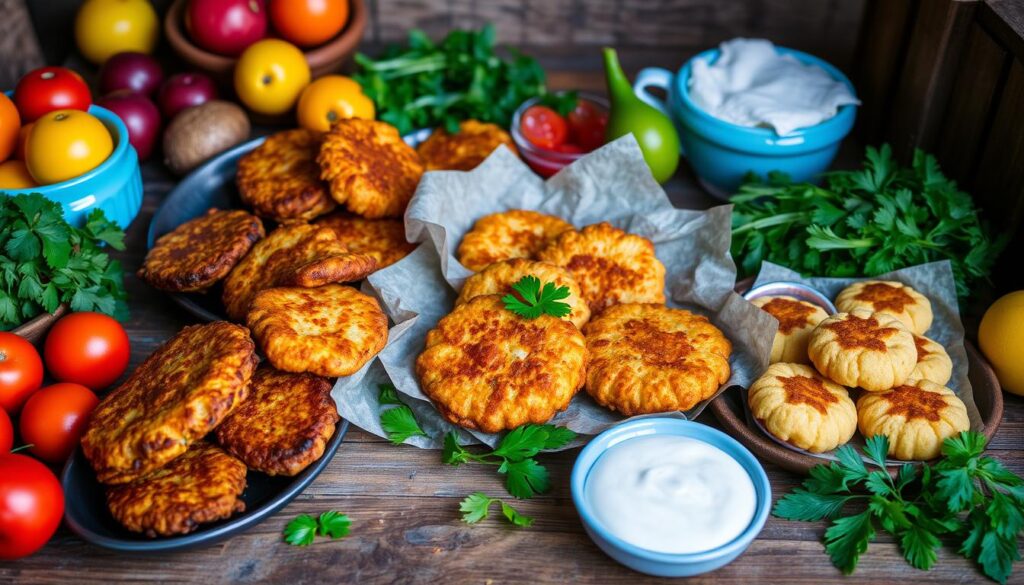Welcome to the vibrant world of authentic Puerto Rican cuisine. It’s a mix of Spanish, African, and Indigenous flavors. You’ll find dishes like mofongo, with its crispy, garlicky fried plantains, and pernil, which is slow-roasted to perfection.
Every dish, from arroz con gandules to tembleque, shares a story of the Boricua people. It’s a celebration of their rich heritage and culture.
Puerto Rican meals are known for their big portions and bold flavors. They use Caribbean ingredients like sofrito, achiote, and coriander. This blend of old-world charm and tropical flavors makes Puerto Rican food unique.
Immerse yourself in the flavors of this culinary paradise. Discover the true essence of Puerto Rican food culture.
Key Takeaways
- Puerto Rican cuisine is a flavorful fusion of Spanish, African, and Indigenous culinary traditions.
- Iconic Puerto Rican dishes include mofongo, tostones, pasteles, arroz con gandules, and tembleque.
- Puerto Rican meals often feature hearty portions of fried plantains, slow-roasted pork, and savory rice and beans.
- The cuisine is characterized by the use of unique Caribbean ingredients like sofrito, achiote, and coriander.
- Puerto Rican food culture is celebrated through its vibrant dishes, often enjoyed with local beverages.
Introduction to Puerto Rican Cuisine
Puerto Rican cuisine is a vibrant mix of flavors. It reflects the island’s rich culinary heritage. This cuisine combines many cultural influences, showing a wide range of traditional ingredients and flavor profiles over the years.
The Taíno people, Spanish colonizers, and African influences all play a part. Together, they create a unique blend of tastes.
At the core of Puerto Rican food are dishes like mofongo and arroz con gandules. These are loved by locals and visitors alike. Other favorites include tostones, pasteles, and lechón asado.
| Favorite Puerto Rican Dishes | Key Ingredients |
|---|---|
| Mofongo | Plantains, pork, seafood, vegetables |
| Arroz con Gandules | Rice, pigeon peas, sofrito, pork |
| Tostones | Green plantains, oil |
| Pasteles | Banana dough, pork, vegetables |
| Lechón Asado | Whole roasted pork, adobo seasoning |
There are also many traditional Puerto Rican desserts. Favorites include tembleque, arroz con dulce, and flan. These sweets highlight the island’s creativity and cultural roots.
Exploring Puerto Rican cuisine is a journey. It takes you from street food to family feasts. This cuisine celebrates the island’s culinary traditions and flavor profiles. It’s a true reflection of Puerto Rico’s cultural legacy.
The Heart of Puerto Rican Meals: Mofongo and Traditional Staples
Mofongo is at the core of Puerto Rican food. It’s made from fried green plantains mashed with garlic, pork crackling, and more. You can eat it as a side or fill it with meats, seafood, or veggies. It’s loved in homes and restaurants across the island.
Preparing Traditional Mofongo
To make traditional mofongo, you need a pilón to mash fried green plantains with garlic and chicharrón. This hard work makes a dish full of flavor and texture. It shows the true spirit of Puerto Rican cooking.
Popular Mofongo Variations
There are many mofongo types, like yuca mofongo and trifongo. These mix plantains, yuca, and green bananas. They bring new tastes and textures to the table.
Serving Suggestions and Accompaniments
Mofongo is best with a tasty broth or sauce. It pairs well with pernil, steak, or seafood. Adding cilantro, lime juice, and olive oil on top is a great touch.
| Mofongo Ingredient | Quantity |
|---|---|
| Green plantains | 5 medium |
| Garlic cloves | 4 cloves |
| Chicharrón (crispy pork skin) | 1/2 cup |
| Vegetable oil | 1/2 cup |
| Salt | 1 teaspoon |
Mofongo is a cherished Puerto Rican comfort food. It’s a key part of the island’s food scene. Whether it’s a side or the main dish, it showcases the rich mofongo recipe that makes Puerto Rican food special.
Rice and Beans: The Foundation of Puerto Rican Meals
In Puerto Rico, rice and beans (arroz con habichuelas) are a key part of meals. They are not just a side dish but a symbol of the island’s culture and history.
The traditional dish includes pink beans cooked with onions, peppers, garlic, and ham hock. It also has calabaza squash and sofrito sauce. The rice is cooked separately with olive oil and salt, making a perfect mix of flavors and textures.
Arroz con gandules is another favorite, using pigeon peas instead of pink beans. It’s a Puerto Rican staple enjoyed all year, especially during holidays.
| Nutrient | Black Beans | Red Beans | Pinto Beans |
|---|---|---|---|
| Magnesium | 70 mg/100g | N/A | N/A |
| Iron | N/A | 144 mg/100g | N/A |
| Fiber | N/A | N/A | 9 g/100g |
Rice and beans recipes are a big part of Puerto Rican culture. But, they can be high in oil and salt. To eat healthier, use less oil and add herbs and spices for flavor instead of salt.
Arroz con habichuelas is full of nutrients, making it great for a balanced diet. Enjoying this dish lets you taste the island’s flavors while being good for your health.
Lechón Asado: The Crown Jewel of Puerto Rican Feasts
No Puerto Rican feast is complete without the star attraction – lechón asado, or roasted pig. This iconic dish is a source of immense pride and celebration for the Puerto Rican people. It showcases their rich culinary heritage and traditions.
Traditional Preparation Methods
The preparation of lechón asado is a true labor of love. The whole pig is first marinated in a savory adobo seasoning blend. This blend includes garlic, oregano, black pepper, vinegar, and water.
It is then slowly roasted over hot coals for several hours. This results in succulent meat and a crispy, golden-brown skin. Every bite bursts with flavor and tenderness.
Regional Variations and Serving Styles
While the basic preparation of lechón asado remains consistent across Puerto Rico, different regions have their own twists. In the renowned lechoneras (pork restaurants) of Guavate, the pork is often served with traditional side dishes. These include rice, beans, and plantains, creating a memorable dining experience.
Another popular pork dish in Puerto Rican cuisine is pernil, a roasted pork shoulder seasoned with the same adobo marinade. Pernil asado is a staple of countless family gatherings and holiday celebrations. It showcases the deep-rooted love for flavorful, slow-cooked meats.
“Lechón asado is the crown jewel of Puerto Rican cuisine, a dish that encapsulates the island’s rich culinary heritage and brings families and communities together in celebration.”
Essential Puerto Rican Meals for Special Occasions
In Puerto Rico, food is a big part of special events. Pasteles are a must during Christmas, and coquito is a hit on New Year’s. These holiday dishes and traditional feast foods are key to Puerto Rican celebrations.
Pasteles are a highlight of the holiday season. They’re like tamales but made with green bananas and filled with pork. Another favorite is arroz con gandules, a rice dish with pigeon peas that’s perfect for holidays.
The lechón asado is a star at any Puerto Rican celebration. It’s slow-roasted pork, seasoned with garlic and herbs. It’s often served with mofongo (mashed plantains).
For dessert, try tembleque (coconut pudding) and arroz con dulce (rice pudding with cinnamon and raisins). These traditional feast foods are a sweet end to any celebration.
The pasteles, arroz con gandules, and coquito showcase Puerto Rico’s rich food culture. They celebrate the island’s unique flavors and traditions.
Street Food and Frituras: A Taste of Local Life
Dive into Puerto Rico’s lively street food scene. Discover the charm of local frituras, or deep-fried treats. These tasty snacks are a big part of Puerto Rican food, showing off the island’s rich food traditions.
Popular Fritter Varieties
Try the famous alcapurrias (fritters filled with meat) and bacalaítos (cod fritters). Other favorites include empanadillas (meat-filled pastries), arepas (seafood-filled fritters), and sorullos de maíz (corn fritters).
Where to Find the Best Street Food
Experience Puerto Rico’s street food at local spots, food trucks, and kiosks. Piñones, near San Juan, is famous for its frituras stalls. Luquillo’s Kiosks in Luquillo also offer over 60 places to try local dishes.
“Fried foods hold emotional value for individuals, evoking memories of home and family.”
Looking for a crispy alcapurria or a tasty bacalaíto? Puerto Rico’s street food is a must-see for food lovers. Enjoy these frituras and dive into the culture that makes Puerto Rican food special.
Coastal Flavors: Seafood in Puerto Rican Cuisine
Puerto Rico’s coastal location deeply influences its seafood cuisine. The island offers dishes like ensalada de pulpo (octopus salad) and asopao de mariscos (seafood stew). These dishes mix Caribbean and Puerto Rican flavors beautifully.
Local ingredients like sofrito, plantains, and tropical fruits are key in these dishes. They create a unique taste experience. Seafood lovers will enjoy dishes like bacalao (salt cod) and fresh fish from the coast.
| Dish | Description | Key Ingredients |
|---|---|---|
| Ensalada de Pulpo | A refreshing octopus salad that showcases the bounty of the Caribbean Sea. | Octopus, green pepper, cherry tomatoes, red onion, olives, olive oil, vinegar. |
| Asopao de Mariscos | A hearty seafood stew that blends the flavors of the ocean with the richness of local spices. | Assorted seafood, rice, sofrito, coconut milk, herbs, and spices. |
| Bacalao | Salt-cured cod fish that is a staple in Puerto Rican cuisine, used in various preparations. | Bacalao (salt cod), sofrito, plantains, olives, and other local ingredients. |
These dishes are just a glimpse into Puerto Rico’s seafood offerings. Exploring San Juan or the island’s towns, you’ll find the seafood is unforgettable. It will surely impress your taste buds.
“The cuisine in Puerto Rico features traditional dishes like guanimes, made with cornmeal and coconut, and uses native crops like malagueta and chagaras.”
Sweet Endings: Traditional Puerto Rican Desserts
Puerto Rico’s warm climate and lively culture have led to a variety of delicious desserts. You’ll find creamy flan and soft tembleque with coconut. These treats show the island’s love for bold, tasty delights.
Iconic Dessert Recipes
Local ingredients like tropical fruits and spices are key in Puerto Rican sweets. Quesitos are pastries filled with a tangy cream cheese mix. Arroz con dulce combines rice, coconut milk, raisins, and cinnamon. These dishes highlight the island’s creativity and care in cooking.
| Dessert | Key Ingredients | Preparation |
|---|---|---|
| Tembleque | Coconut milk, cornstarch, sugar, salt | Combine ingredients, cook until thickened, chill until set |
| Límber | Evaporated milk, water, sugar, vanilla | Blend ingredients, freeze in molds until firm |
| Budín de Pan | Dried bread, condensed milk, whole milk, sugar, cinnamon, vanilla, raisins | Soak bread in milk, mix with other ingredients, bake until custard-like |
Holiday Sweet Specialties
During holidays, Puerto Ricans enjoy even richer treats. Coquito, a creamy coconut eggnog, is a favorite. Buñuelos, crispy fritters, are also a hit. These treats embody the joy of holiday celebrations and sharing with family.
“Dessert is probably the most important stage of the meal, since it will be the last thing your guests remember before they pass out all over the table.”
Visitors to Puerto Rico can try a variety of Puerto Rican sweets and traditional desserts. From flan to tembleque, these desserts celebrate the island’s culture and culinary traditions.
Traditional Cooking Methods and Techniques
Exploring Puerto Rico’s rich culinary heritage takes us back to traditional cooking methods. These methods have been passed down for generations. Puerto Rican cuisine combines Spanish, African, and Taíno influences, creating unique flavors and preparations.
The use of sofrito is a key technique in Puerto Rican cooking. It’s a flavorful base made from garlic, onions, peppers, and cilantro. This mixture adds depth and complexity to many traditional dishes.
- Slow-roasting, as seen in the iconic lechón (roast pork), makes the meat tender and the exterior caramelized.
- Frying, like for tostones (twice-fried green plantains) and frituras (fritters), creates crisp, golden-brown treats.
- Stewing, as in sancocho stews, combines meats, vegetables, and plantains for comforting dishes.
Traditional Puerto Rican kitchens use essential tools like the pilón (mortar and pestle) and the caldero (a heavy pot). These tools help preserve the authentic flavors and textures of Puerto Rican dishes.
Exploring Puerto Rican cuisine reveals the importance of traditional cooking methods. These methods, from the aromatic sofrito to the slow-roasted lechón, are the heart of Puerto Rican culinary heritage.
The Cultural Significance of Puerto Rican Beverages
Beverages are very important in Puerto Rican culture. The famous piña colada was created on the island. Rum-based cocktails show the nation’s long history of rum making.
Rum is everywhere in Puerto Rican drinks. The island is known as the Rum Capital of the World. It has over 70 rum brands under the Rums of Puerto Rico quality seal. Bartenders here are experts at making new, rum-based cocktails.
But it’s not just rum. Puerto Rican drinks also use local ingredients like coconut milk and spices. These ingredients add depth and flavor to drinks like coquito, enjoyed during Christmas.
Local beverages are also key to Puerto Rican culture. Fresh fruit juices and punches are made with tropical fruits. And, of course, there’s the smooth Puerto Rican coffee, enjoyed every day.
“Puerto Rico’s bartenders are skilled in crafting innovative rum-based cocktails, and sampling locally grown coffee is a highlight of visiting the island.”
Drinks are a big part of Puerto Rican life. From festivals to morning cafes, they show the island’s culture. Enjoying a piña colada or trying new drinks lets you see the heart of Puerto Rico.
Conclusion
Starting your Puerto Rican culinary journey opens a world of flavors. You’ll find everything from hearty mofongo and arroz con gandules to festive lechón asado. The food scene is vibrant, offering a chance to dive into the island’s true tastes and traditions.
The variety in Puerto Rican food is amazing. From tasty street food and frituras to fresh seafood and sweet desserts, there’s so much to try. You’ll see chefs combining old traditions with new ideas, creating unique dishes.
Every bite you take will show you the heart of Puerto Rico. You’ll learn to love the culture and the friendly people. This journey will leave you with unforgettable memories and a new love for Puerto Rican food.
FAQ
What are some of the key influences on Puerto Rican cuisine?
What are some of the most popular Puerto Rican dishes?
How is mofongo, a quintessential Puerto Rican dish, typically prepared?
What is the role of rice and beans in Puerto Rican cuisine?
What is the significance of lechón asado in Puerto Rican culture?
What are some of the traditional Puerto Rican desserts and special occasion treats?
What are some of the popular Puerto Rican street food and fried treats?
How does Puerto Rico’s coastal location influence its cuisine?
What are some of the traditional cooking methods and techniques used in Puerto Rican cuisine?
What is the cultural significance of beverages in Puerto Rican cuisine?
Source Links
- 8 Puerto Rican Dishes You Shouldn’t Miss – Lunch Rush – https://www.ezcater.com/lunchrush/office/primer-puerto-rican-dishes-cuisine-try-ever-right-now/
- 42 Popular Puerto Rican Foods You Have To Try At Least Once – Tasting Table – https://www.tastingtable.com/669332/popular-puerto-rican-foods-you-have-to-try-at-least-once/
- The 35 BEST Puerto Rican Recipes – https://gypsyplate.com/the-best-puerto-rican-recipes/
- Guide to Traditional Puerto Rican Food – https://www.discoverpuertorico.com/article/guide-to-traditional-puerto-rican-food
- Puerto Rican cuisine – https://en.wikipedia.org/wiki/Puerto_Rican_cuisine
- Puerto Rican cuisine: An introduction – https://www.myguidepuertorico.com/usefulinfo/puerto-rican-cuisine-an-introduction
- Traditional Puerto Rican Mofongo (25 Minutes!) | Salima’s Kitchen – https://salimaskitchen.com/mofongo/
- Puerto Rican Food: 22 Traditional dishes to Try in Puerto Rico or At Home – https://theplanetd.com/puerto-rican-food/
- The Must Try Staples of Puerto Rican Cuisine — JP Linguistics – French, Italian, Spanish Classes in NYC – https://www.jplinguistics.com/spanish-blog/the-must-try-staples-of-puerto-rican-cuisine
- The History of Puerto Rican Food (Abridged!) – Familia Kitchen – https://familiakitchen.com/a-very-brief-history-of-puerto-rican-cuisine/
- Latin America’s rice and beans dishes provide more than deliciousness – https://www.heart.org/en/news/2024/10/11/latin-americas-rice-and-beans-dishes-provide-more-than-deliciousness
- Five Favorite Puerto Rican Holiday Recipes – https://www.discoverpuertorico.com/article/five-favorite-puerto-rican-holiday-recipes
- A getaway in living color: Puerto Rico’s South and West regions – https://www.travelzoo.com/blog/a-getaway-in-living-color-puerto-ricos-south-and-west-regions/
- London, Nassau, Cancun, Punta Cana, Mexicali, San Jose, Puerto Vallarta, San Juan, and Oranjestad Shine as the Most Popular International Holiday Travel Destinations of 2024 in Europe, Caribbean and US – Travel And Tour World – https://www.travelandtourworld.com/news/article/london-nassau-cancun-punta-cana-mexicali-san-jose-puerto-vallarta-san-juan-and-oranjestad-shine-as-the-most-popular-international-holiday-travel-destinations-of-2024-in-europe-caribbean-and-u/
- Puerto Rican Food! Iconic Meals that Will Blow Your Mind – https://eclecticemissary.com/2023/03/22/puerto-rican-food-iconic-meals-that-will-blow-your-mind/
- Von Diaz’s Essential Puerto Rican Recipes (Published 2021) – https://www.nytimes.com/2021/03/22/dining/puerto-rican-food-von-diaz.html
- 16 Essential Puerto Rican Recipes – https://www.allrecipes.com/gallery/best-puerto-rican-recipes/
- The Joy and Comfort of Fried Food – https://melissafuster.wordpress.com/2017/03/27/the-joy-and-comfort-of-fried-food/
- FRITURAS: The Illustrated Puerto Rican Spanish Guide to Fried Food – https://www.speakinglatino.com/frituras-puerto-rico-food-guide/
- Puerto Rico’s West Coast Flavor – https://gardenandgun.com/feature/puerto-ricos-west-coast-flavor/
- How to Make Puerto Rican Style Octopus Salad (Ensalada de Pulpo) – https://www.diningtraveler.com/2024/03/how-to-make-puerto-rican-style-octopus-salad-ensalada-de-pulpo.html
- 10 Essential Foods to Eat on a Trip to Puerto Rico – https://www.afar.com/magazine/iconic-puerto-rico-foods-and-where-to-try-them
- sweets – RICO Puerto Rico – https://ricopuertorico.wordpress.com/tag/sweets/
- Tembleque – Coconut Pudding – https://www.goya.com/en/recipes/tembleque-coconut-pudding
- Coquito Cake – https://www.goya.com/en/recipes/coquito-cake
- The Complete Guide to Traditional Puerto Rican Food: Top 11 Picks – https://thecolectivogroup.com/puerto-rican-food/
- Your Guide to Traditional Puerto Rican Food – https://www.conquistadortravels.com/post/guide-to-traditional-puerto-rican-food
- Puerto Rican Drinks: A Journey of Flavors and Traditions – I Love Poke Bar – https://ilovepokebar.ca/puerto-rican-drinks-2/
- Food & Drinks – https://www.discoverpuertorico.com/island/food-drinks
- Explore Flavorful Puerto Rican Cuisine – https://www.eatright.org/food/cultural-cuisines-and-traditions/central-and-south-american/puerto-rican-favorites-made-healthy
- Exploring the flavors of Puerto Rico – https://www.restaurant-hospitality.com/chef-news/exploring-the-flavors-of-puerto-rico
- Puerto Rican recipes – https://worldcoocking.com/puerto-rican-recipes-complete-guide/




1 thought on “Traditional Puerto Rican Meals: What You Need to Know”